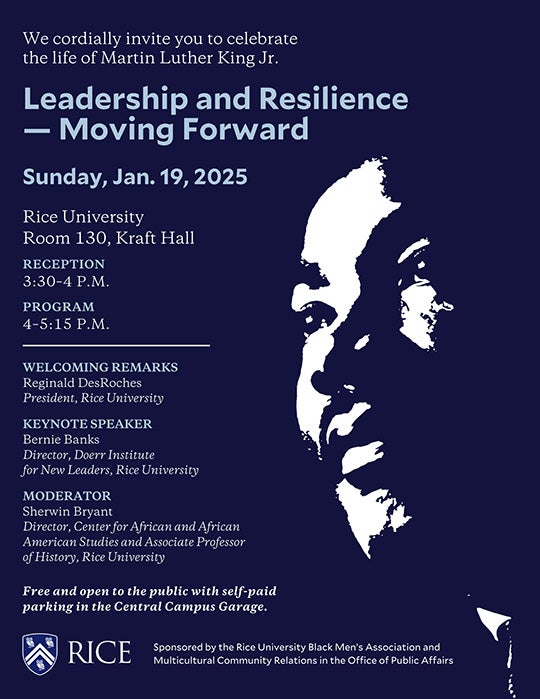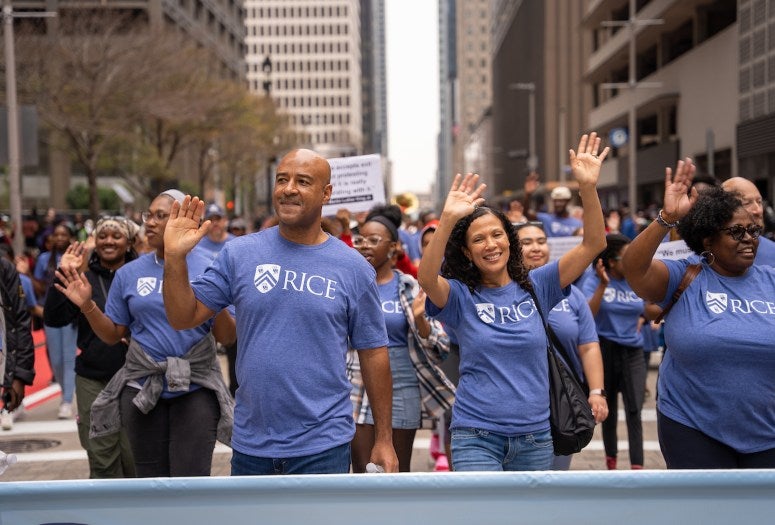
Rice University invites the community to join in celebrating Martin Luther King Jr. Day with events honoring his life and legacy as well as insights from university experts on the continued relevance of his work.
The Rice Black Men’s Association and Multicultural Community Relations in the university’s Office of Public Affairs are helping organize the annual MLK Program and Vigil Jan. 19. The reception begins at 3:30 p.m. followed by the program at 4 p.m. This year’s theme is “Leadership and Resilience — Moving Forward.” Presenters include Rice President Reginald DesRoches; Bernie Banks, director of the Doerr Institute for New Leaders; and Sherwin Bryant, director of the Center for African and African American Studies and associate professor of history.
Media planning to attend the vigil should RSVP to Brandi Smith at brandi.smith@rice.edu.
On Jan. 20, Rice students, alumni, employees, family and friends will host a parade float and walking group including the Marching Owl Band for the 47th annual Original MLK Jr. Day Parade. For details about the parade route, timing and the free MLK Festival and Children’s Day of Service following the parade, click here.
In addition to these events, Rice experts are available to provide insights on the enduring impact of King’s work and legacy.
Reflecting on King’s journey
Alexander Byrd, vice provost of diversity, equity and inclusion and associate professor of history, specializes in the Atlantic slave trade and Black life in the Jim Crow South.
“King’s legacy, of course, is profound,” Byrd said. “But this year I’ve also been pondering some of the smaller details of his life — like the particulars of his drive from Atlanta to Montgomery, Alabama, in 1954 when he was invited to interview for the open position at Dexter Avenue Baptist Church.”
Action and urgency
Bryant specializes in Afro-Latin America, slavery, race and the law in the Americas, Black geographies and community histories.
“The importance of celebrating MLK Day is found for me in the very feeling that we should be in action on that day, almost as though it is not a holiday upon which we might rest,” Bryant said. “This is perhaps because King and the movement that propelled him were both so urgent and unrelenting. I have been thinking about what the children of integration faced as they integrated America’s schools a lot lately. Perhaps those histories of dignity in the face of crassness and cruelty are what loom largest for me on this day of observance and reflection.”
Power of collective action
Fay Yarbrough, senior associate dean of faculty and graduate programs and William Gaines Twyman Professor of History, focuses on 19th century U.S. history, African American history and Native history.
“Most people focus on Dr. King and his powerful speeches at important moments,” Yarbrough said. “I like to take the day as an opportunity to think about the people he was speaking to, the people in the crowds in Washington, D.C., or at churches who listened to what he said and then decided to do something. Many individual people had to take action for big societal changes to occur. Sometimes we can feel small and we wonder what we can do, but Dr. King’s life is a reminder that each of us can do something.”
Justice as an ongoing project
Jenifer Bratter, professor and associate chair in sociology and director of Building Research on Inequality and Diversity to Grow Equity, specializes in the sociology of race and ethnic relations, race and family demography, multiracial identities and interracial families.
“Reflecting on MLK’s legacy reveals that pursuing justice and equality is an ongoing project,” Bratter said. “Celebrating this legacy requires us to reckon with the fact that attaining justice requires leading with compassion, purpose and a willingness to move beyond our comfort zones, listen to each other and build broader coalitions.”
For more information or to arrange an interview with Rice experts, contact media relations specialist Brandi Smith at brandi.smith@rice.edu, or Chris Stipes, executive director of news and media relations, at chris.stipes@rice.edu.

